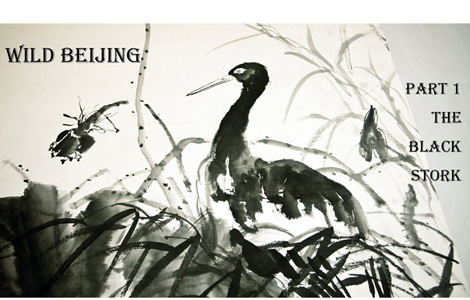PBOC ends credit crunch, to go further
Updated: 2013-06-26 20:59
(Xinhua)
|
||||||||
SHANGHAI - China's central bank took a sharp turn Tuesday evening, when it promised to inject money into a temporary liquidity shortage after rejecting banks' pleas for cash over the past two weeks.
The move has been interpreted as regulators' decision to end the credit crunch that caused interbank rates to surge to double digits and pounded the stock market into bearish territory.
The People's Bank of China (PBOC) has changed its stance, as starving the financial system of cash has been crippling the economy in a broader scope. The Shanghai Composite Index reported its biggest slump in four years on Monday, after the PBOC published an internal notice implying tight liquidity. The benchmark further tumbled 6 percent Tuesday before reversing the retreat on rumors of a declaration of support, which was issued by the bank on Tuesday night.
"The market is full of fear and rumors, and that let the government smell financial risks," said Zhang Zhiwei, chief China economist at Nomura Securities Co., Ltd.
The benchmark seven-day fixing repo dipped 78 base points to 7.22 percent as of 11:30 a.m. Wednesday, and the Shanghai Interbank Offered Rate (SHIBOR) overnight rate slid 18 base points to 5.55 percent at the same time. The SHIBOR overnight rate shot up to 25 percent last Thursday, when banks rushed to each other for money.
Banks with aggressive off-the-balance-sheet lending felt the pain of the cash squeeze when they borrowed money at exorbitant rates while watching stock prices plummet.
"Regulators have successfully warned the market," said Li Xunlei, chief economist with Haitong Securities. "Changing the stance is the right decision. After all, the central bank has an obligation keep the financial system afloat with liquidity."
China Minsheng Banking Group, a mid-sized bank, promised to clear all excessive non-standard assets in an investor meeting held after its stock price plunged 10 percent on Monday. In a report, Barclays warned that medium and small banks have higher interbank assets as a percentage of their total assets than large banks.
Another factor forcing the PBOC to dial back its tight liquidity stance was that the market reacted to regulators' call in a way that was the opposite of what regulators had hoped for. In desperate need of cash, banks rolled out massive wealth management products (WMPs) to attract deposits, and the yields of these investments grew much higher than previous ones, thus posing greater risks.
The average yield of WMPs has been climbing for four weeks, according to Bankrate, a WMP aggregating website. Citic Bank issued a four-month WMP with an interest rate of 6 percent, while Huaxia Bank produced a 72-day WMP with a rate of 7 percent, which doubled China's benchmark deposit rate.
The central bank relented on its stance of a tightened credit crunch, as economists warned that a prolonged credit crunch would put the brakes on the economy, which is already facing mounting downward pressures.
Some banking executives told the press that they will have to raise interest rates if interbank lending remains high. A rising interest rate would be the last thing Chinese companies want to see during their battle with growing overcapacity.
Goldman Sachs trimmed its forecast on China's GDP growth from 7.8 percent to 7.4 percent due to the recent monetary tightening. Meanwhile, Moody's warned that keeping the banking system short of liquidity would entail risks that could have credit negative implications.
"If liquidity tightening continues, the possibility of an economic hard-landing will increase," said Liu Ligang, chief China economist at ANZ.
The stand-off in the money market is believed to be part of the PBOC's commitment to containing runaway credit growth and reducing financial risks accumulated in shadow banking. They have not finished the job, but the battle is nearing an end.
However, there will be more rounds for regulators wrestling with shadow banking.
Analysts say regulators must be prepared to defuse the fundamental catalysts for the explosive growth of shadow banking, which would mean liberalizing interest rates, curbing local governments' wild investments and improving the transparency of WMP sales.
Chinese banks are only allowed to offer PBOC-guided rates to depositors, and those interest rates are flat with the rate of inflation, which has bolstered Chinese depositors' readiness to turn to WMPs that offer higher returns.
Meanwhile, banks are banned from lending money to certain industries beset by overcapacity as well as local government financing vehicles (LGFVs). So, when borrowers from these categories knock on a bank's door for money, they will be asked to get a loan with a high interest rate from money raised in WMP sales.
This is where risks creep in. A huge proportion of local government investments have not generated any cash flow, and the only reason China has not seen massive defaults is that the projects received either fiscal support or took on new debts to repay the old ones.
Investors, on the other hand, have little information about where their money goes when they buy WMPs, and because the products are sold over banks' counters, many believe these purchases are as harmless as putting money into a savings account.
As the medium, banks further complicate the issue by selling short-term WMPs to finance long-term projects, as longer maturity yields higher returns. When the WMPs are due, banks just go to the interbank market and borrow money to repay investors. The interbank borrowing costs before the credit crunch were around 3 percent, but banks can charge 10 percent interest on a loan to an LGFV.
"To squeeze the pimple of over-leverage, we need an overhaul of the current fiscal system," said a well-respected researcher at a think tank of the State Council, who requested anonymity in discussing the matter.
"As the financing vehicles of some governments in western China can take on interest rates as high as 18 percent, how can the money go to the real economy?" the researcher asked.
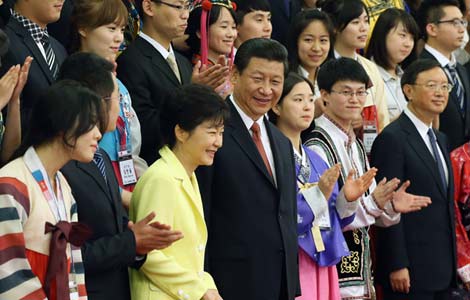
 Visit aids 'trust-building process'
Visit aids 'trust-building process'
 King of Pop returns
King of Pop returns
 Crowds cheer Court decision on gay marriage
Crowds cheer Court decision on gay marriage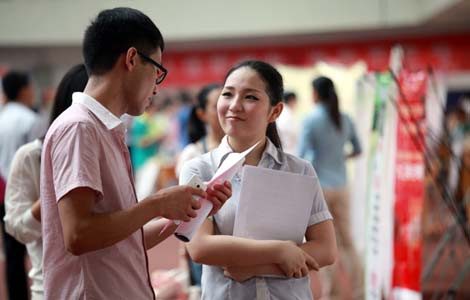
 Hiring index signals further job weakness
Hiring index signals further job weakness
 Dance becomes popular stress relief
Dance becomes popular stress relief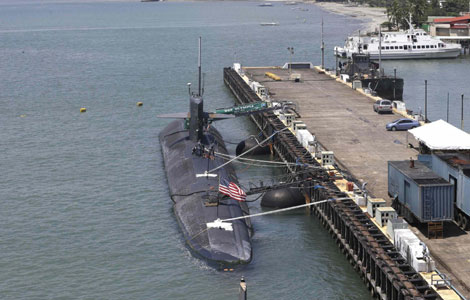
 Philippine, US start Naval exercise in S China Sea
Philippine, US start Naval exercise in S China Sea
 Supreme Court gay rights ruling celebrated across US
Supreme Court gay rights ruling celebrated across US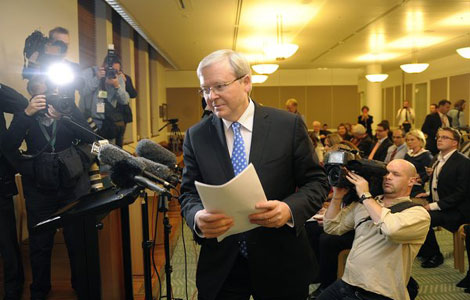
 Rudd returns as Australian PM after Gillard
Rudd returns as Australian PM after Gillard
Most Viewed
Editor's Picks

|

|

|

|

|

|
Today's Top News
US Senate approves landmark immigration bill
US collects Internet data on citizens
More Americans see Snowden as patriot: Poll
Visit aids 'trust-building process'
Crowds cheer gay marriage decision
Industry enjoys profitable month
China's civil servants top 7 million
King of Pop returns
US Weekly

|

|
